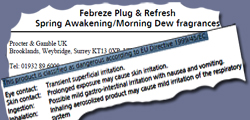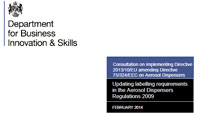 |
 |
|
Consultation On Aerosol Dispensers Subject To New EU Directive Aerosols are commonly used in the home more than ever before, from fresh air sprays to carpet/fabric cleaners. One example being products under the name of Febreze made by Proctor & Gamble. Their Plug & Refresh Spring Awakening/Morning Dew fragrances is classed as dangerous by the EU. Febreze products generally contain 89 air contaminants, including acetaldehyde, propylene glycol, limonene and methyl pyrrolidone ethylacetate, which is toxic to the brain and nervous system. Couples thinking of starting a family should be especially wary of these products, as many phthalates have been found in air fresheners. Phthalates are hormone disrupters that particularly harm pregnant women and young children. In the USA, The National Resources Defence Council (NRDC) found that most air fresheners contain phthalates, which are at the centre of a large debate about their negative health affects. High exposure to certain phthalates, also found in cosmetics, nail polish, paint and other everyday items, can cause cancer, developmental and hormonal abnormalities and can affect fertility. Correct labelling and advice for storage and use, sadly does little to prevent harm simply because the majority of consumers do not read labels on the products they buy; and just assume they are safe to use. Air fresheners work in one of, or in a combination of, the following four ways: 1) by killing your ability to smell by way of a nerve-deadening chemical The consultation is relevant to:
‘....BIS have liaised closely with representatives of the UK aerosol industry at all stages in the development of the 2013 Directive. The United Kingdom’s policy objectives are to ensure that only safe aerosol dispensers are placed on the market and that the labelling of aerosol dispensers for flammability hazards and precautionary statements is in line with that specified in the CLP Regulation. The 2009 Regulations, as amended by the 2014 Regulations, will continue to provide an updated safety framework for aerosols dispensers and enhanced consumer protection.’ Source: Dept Bus Innovation and Skills / The Global Campaign for Recognition Of Multiple Chemical Sensitivity / Proctor & Gamble / Healthnews Digest / BBC News / NRDC Download Febreze product Safety Datasheet here and/or from the E-Library Database using search category: 'cancer' |
 These contaminants are linked to cancer, are toxic to the reproductive system and cause allergies. They are also considered to be a cause of asthma, and can cause problems with those already suffering with asthma.
These contaminants are linked to cancer, are toxic to the reproductive system and cause allergies. They are also considered to be a cause of asthma, and can cause problems with those already suffering with asthma.